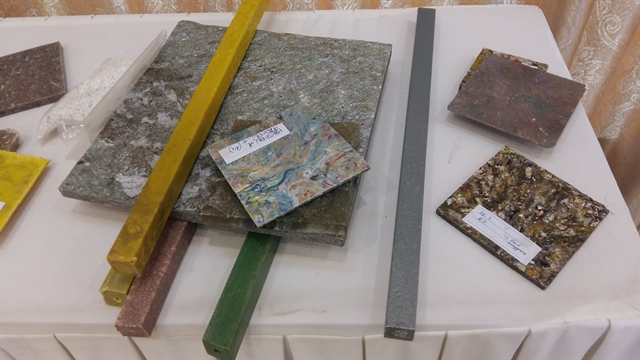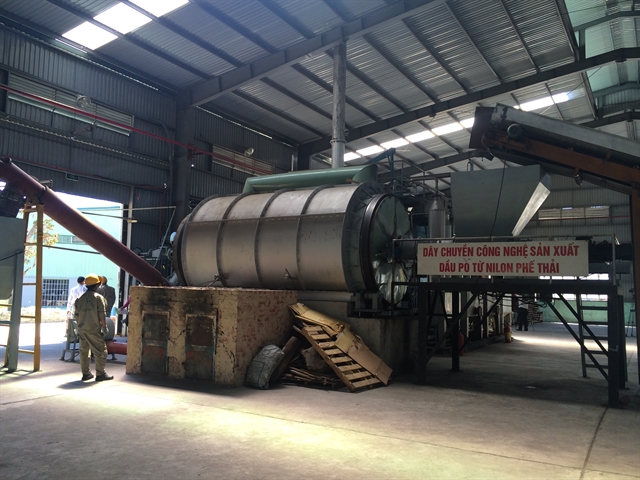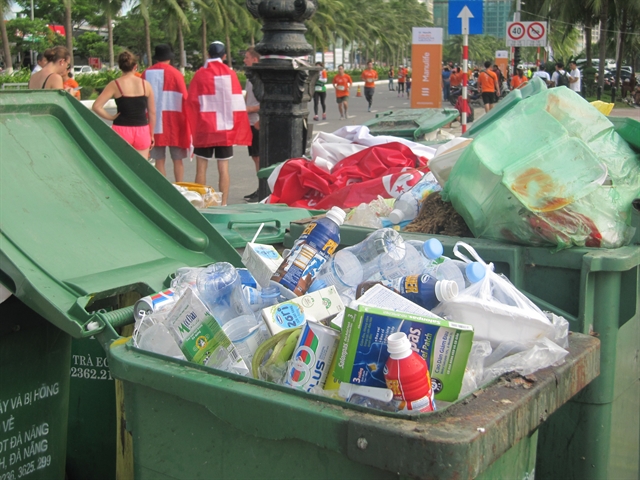First plastic waste project to launch in the city
The Da Nang Environment and Urban Company (URENCO), in co-operation with EverGreen Labs Consultant and EverGreen Social ventures, will start a pilot project on plastic waste recycling in the city later this year.
 |
| Recycled tiles are processed from plastic waste at EverGreen Labs company in Da Nang. The city plans to operate the first pilot plastic waste treatment project for recycling single-use plastic into useable products. |
URENCO said the project will cover 300sq.m at Khanh Son dump – the largest overloaded and polluted dump in the city – with a designed capacity to process 150 tonnes of plastic waste each month.
According to the city’s department of natural resources and environment, the pilot project will be operating in 12 months for evaluation before expanding the recycling operation.
The project would be built over three months with an investment of US$100,000, URENCO said at the signing ceremony on Tuesday.
It’s the first project specialising in recycling nylon bags, single-use plastic straws and cups, and Styrofoam, with hi-tech incineration equipment.
The processed plastic waste could be used to make public or hotel trash bins, planks, gym poles or climbing boards, panels for furniture, as well as floor tiles.
 |
| A production line at a waste treatment plant at Khanh Son Dump in Da Nang. |
Jan Zellmann of Germany, who is the vice director and co-founder of EverGreen Labs in Da Nang, said his company offered a solution to recycle waste at waste disposal depots.
He said waste pickers only collected valuable waste including cans, plastic bottles, paper and metal, but they refused to take glass, foam, single-use cups and straws because they can't be sold.
Jan said his company had to buy the low-value waste at the same price as saleable waste from garbage collectors.
A bio-tech start-up business in the city currently recycled about 100 tonnes of household organic waste into 2,000 litres of bio-dish soap each day.
Last year, a zero plastic-waste ocean project in Da Nang had helped collect and classify 7.7 tonnes of plastic waste and nearly 200,000 cans and 14 tonnes of paper, as well as four tonnes of other valuable waste, in the two coastal districts of Son Tra and Thanh Khe.
The sorting of the waste earned US$4,300.
Nearly 140,000 local residents received guidance on waste classification at source, while 22,000 primary and secondary school students learned about waste sorting and reduction.
More than 700 fishermen, traders and organisations joined the communications effort on waste reduction, and 77 owners of fishing boats have committed not to dump plastic waste into the sea.
 |
| Plastic bottles are piled up in a bin on coastal Vo Nguyen Giap Street in Da Nang. The city produces 1,200 tonnes waste, of which 22 per cent is plastic, each day. |
Da Nang is the first urban area in the country to promote "no plastic bottles" at State offices and buildings, while 30 milk-tea shops have committed to using bio-straws and not use single-use plastic cups.
Vice director of Da Nang City’s natural resources and environment department, Dinh Quang Cuong, said 75 per cent of State buildings in the central city stopped using plastic bottles from 2018, and more recycling bins were installed at public sites.
A ‘5 R’ communication campaign, “Recycle, Reduce, Re-use, Refuse and Repair", is being carried out in the community, schools, residential quarters and offices.
The city with a population of 1 million released 1,200 tonnes of garbage, of which 22 per cent was plastic, and 55 per cent was household organic waste, each day.
An investment of VND172 billion ($7.5 million) has been arranged for building depots and 4,000 garbage trucks in reducing daily waste downtown.
In 2016, Da Nang invested $19 million to build the first waste treatment plant with a capacity of 700 tonnes per day, but it failed to process any rubbish due to poor technology.
(Source: VNS/ DA NANG Today)